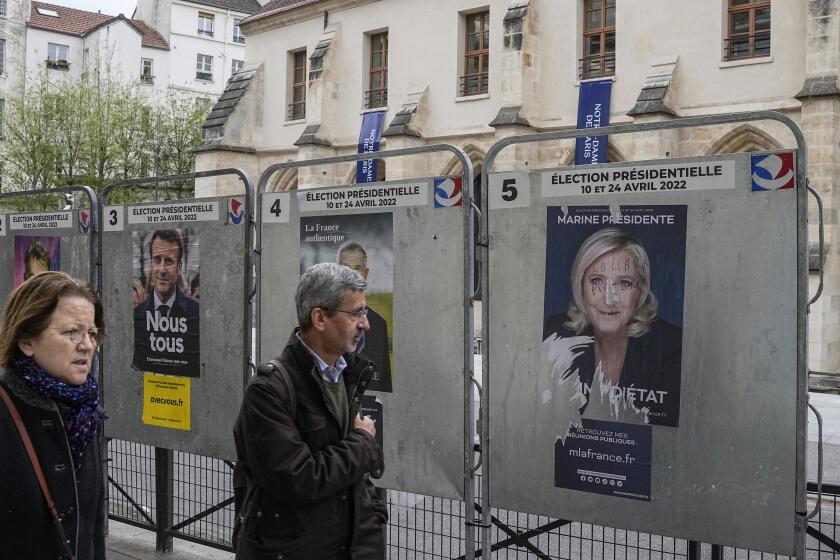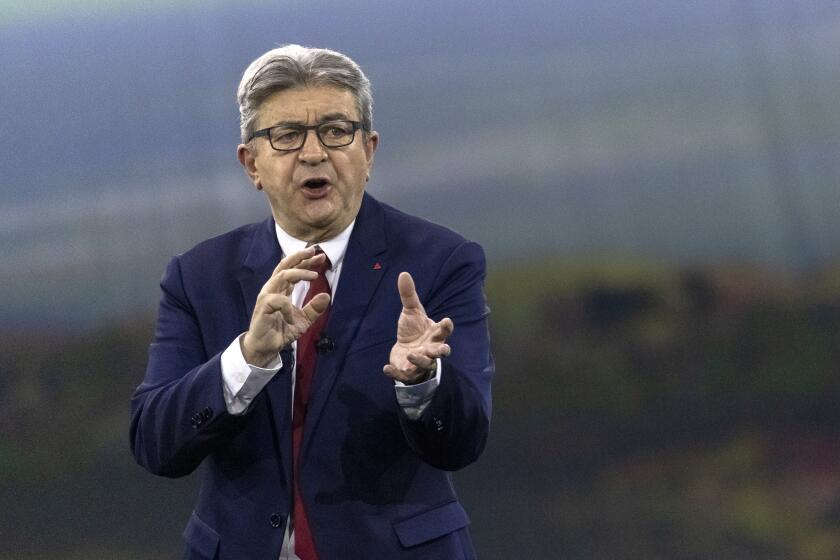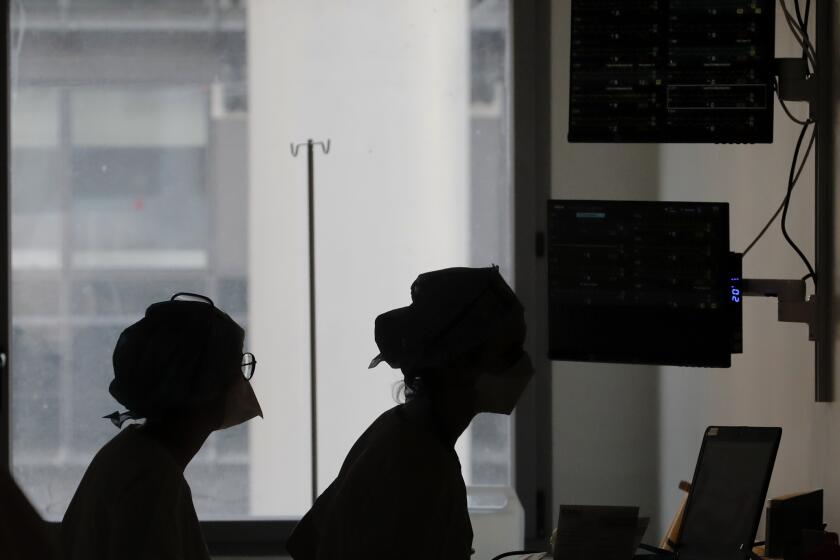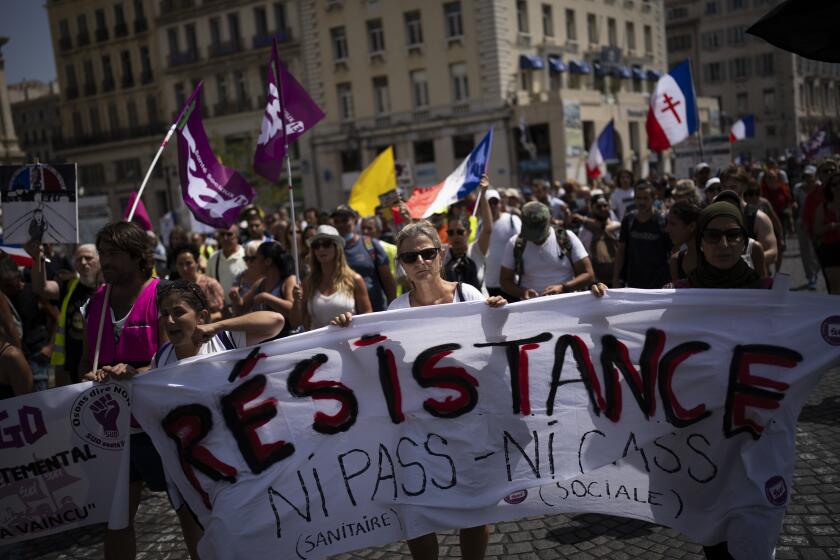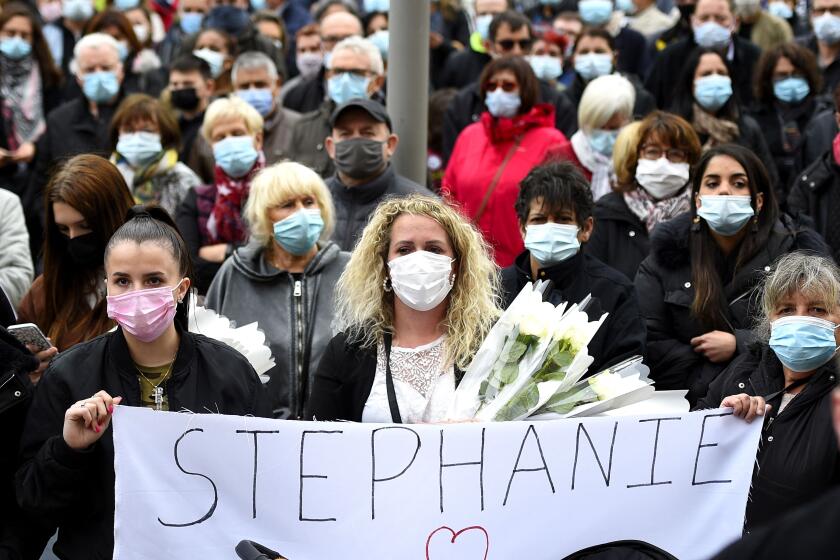At a pivotal moment for Western unity over Ukraine, a divisive French presidential race
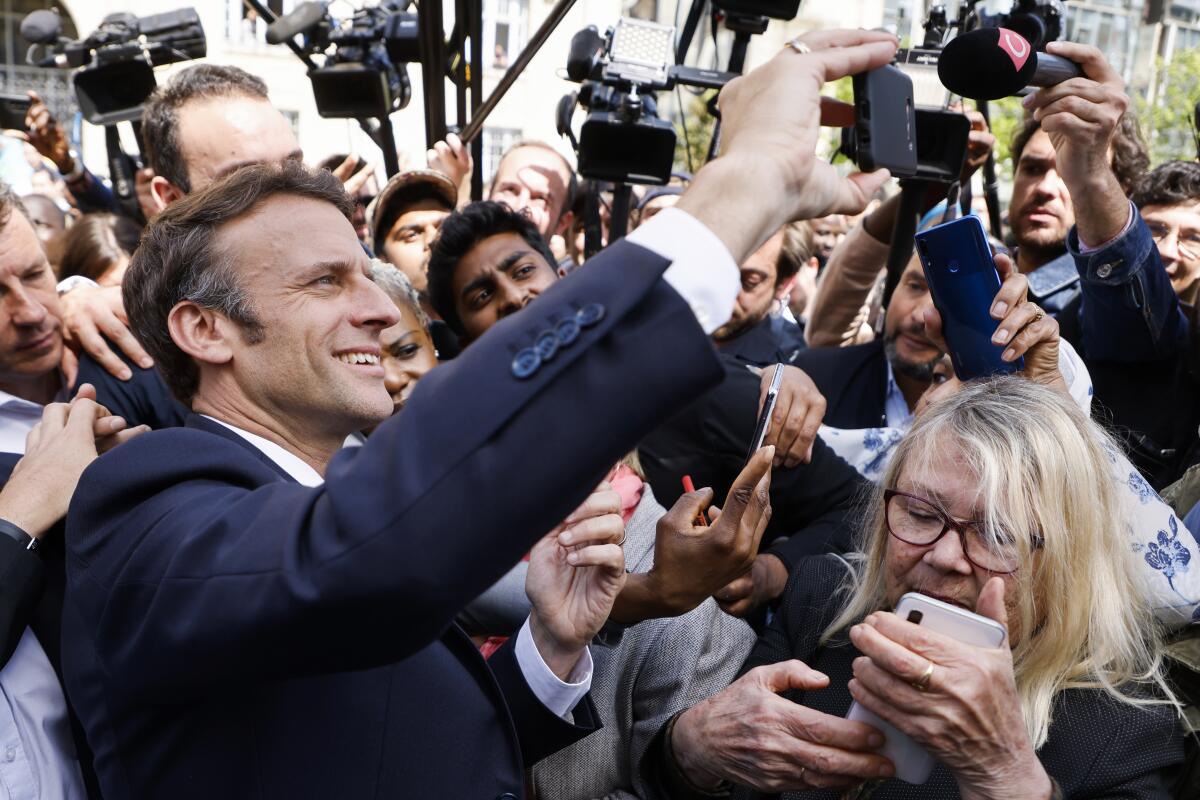
- Share via
PARIS — Days before a consequential French election, at a fraught moment of the war on Europe’s eastern edge, President Emmanuel Macron had a telling debate exchange with challenger Marine Le Pen, who embodies the far right’s best chance yet to seize power in one of the continent’s most important and influential nations.
“I am not like you,” declared Le Pen, 53, a longtime politician who has worked hard to soften her extreme anti-immigrant, anti-Muslim and anti-European Union image since the two last went head to head at the polls five years ago.
“You are not like me — thank you for the reminder,” retorted Macron, 44, an EU-embracing, cosmopolitan centrist who became France’s youngest elected president when he trounced Le Pen in the 2017 contest.
Polls suggest that Macron will again prevail in Sunday’s runoff vote against the nationalist-populist Le Pen, but by what could be a considerably closer margin than the last time around.
Looking at the French presidential election makes me grateful for our two-party system and constitutional safeguards.
This contest, analysts say, is driven by a divisive political dynamic: Backers of both Macron and Le Pen view the opposing camp’s candidate not merely as unappealing but as an active threat to the country and its way of life.
Even after the election is over, the deep fissures laid bare by the campaign will continue to reverberate outside France’s borders.
The country is the European Union’s second-biggest economy and the bloc’s most powerful state alongside Germany. As a permanent member of the United Nations Security Council, it is the only EU country with veto power in the world body. And the war in Ukraine vastly raises the stakes for European unity.
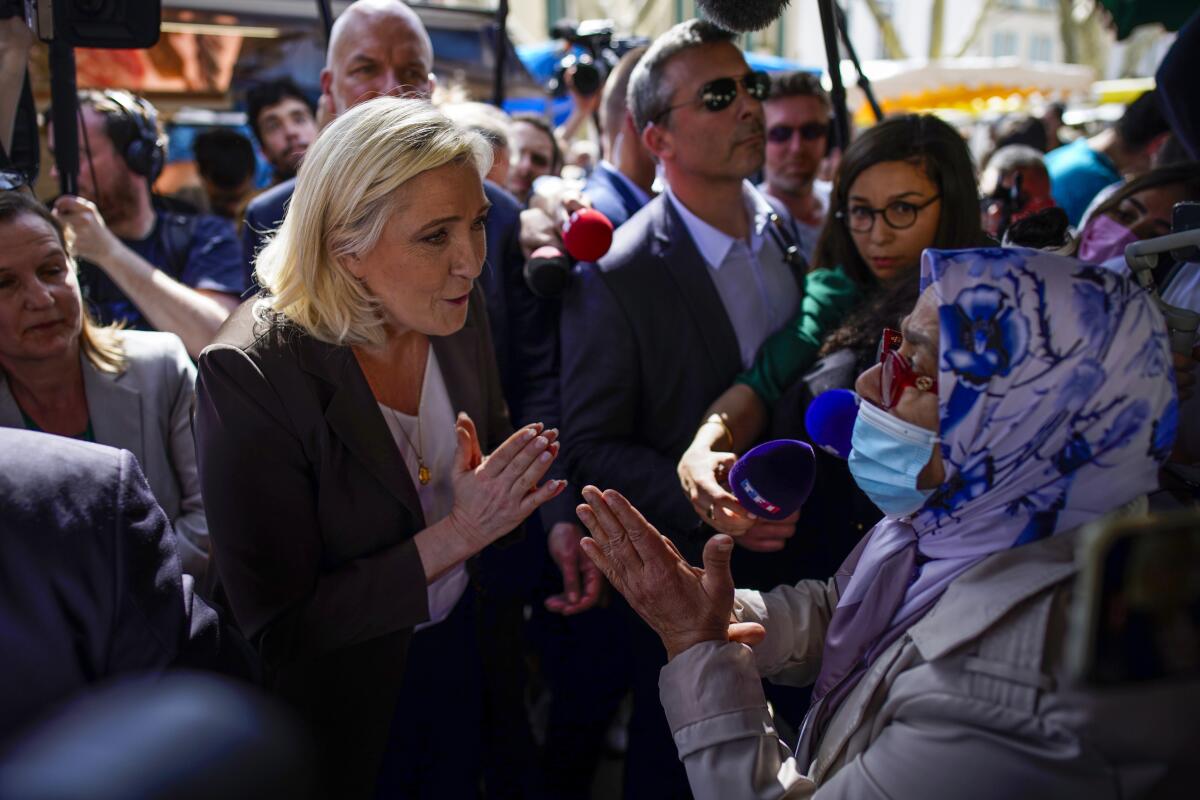
Although Le Pen has condemned Russia’s invasion of its neighbor, she opposes sanctions on Russian gas and oil, a direction in which the EU is moving. She has backed off from her previous advocacy for quitting NATO but says she would withdraw France from the alliance’s integrated command structure, has been friendly with Russian President Vladimir Putin and argues for a “strategic rapprochement” between the North Atlantic Treaty Organization and Russia once the fighting in Ukraine ends.
In a sign of their concern over what might happen in Sunday’s runoff, the leaders of Germany, Spain and Portugal published a column Thursday in several European papers urging French voters to back Macron. The commentary did not mention either candidate by name but referred to one
as a “democratic” politician who supports a “powerful and autonomous European Union” and the other as an “extreme-right candidate who openly sides with those who attack our freedom and democracy.”
Analysts say that simply by being a more viable candidate in Sunday’s rematch than she was five years ago, Le Pen has already achieved a significant victory. She and Macron were the two top vote-getters in the April 10 first-round vote, separated by fewer than 5 percentage points.
With war singeing the European Union’s eastern edge, French voters will make a choice in a presidential election that will have an effect beyond the country’s borders.
“Never, in the modern history of France, never has a candidate from the extreme right gotten so close to power,” said Vincent Martigny, a professor of political science at the University of Nice.
Since the initial vote this month, Macron has widened his lead, polling up to 12 percentage points ahead in some surveys. Nonetheless, Le Pen’s first-round performance was seen as a wake-up call for the French political establishment.
Macron swept into office in 2017 promising a new kind of politics, appealing to voters on both sides of the political spectrum. But in some quarters, disillusionment has set in.
Once ensconced in the Elysee Palace, he veered to the right, alienating supporters on the left, and failed to deliver the environmental program that activists had hoped for. Many of those struggling economically say Macron is out of touch, and a common gibe labels him the “president of the rich.”
News Alerts
Get breaking news, investigations, analysis and more signature journalism from the Los Angeles Times in your inbox.
You may occasionally receive promotional content from the Los Angeles Times.
The president got a brief bump in the polls over his statesmanlike role before and after Russia’s Feb. 24 invasion of Ukraine, but as the war has dragged on for two months, initial enthusiasm for his diplomacy on the world stage has subsided.
On the campaign trail, Le Pen has played down earlier demands to end immigration, leave the European Union and ban the Muslim head scarf in public places. Instead, she has stressed pocketbook issues that resonate well with not only her voter base but also Macron’s.
Conversely, Macron has moved to the right on some issues to try to steal some of Le Pen’s thunder and keep abreast of a general rightward shift by the French electorate. He has toughened his stance on immigration and appointed a hard-line interior minister to burnish his law-and-order credentials.
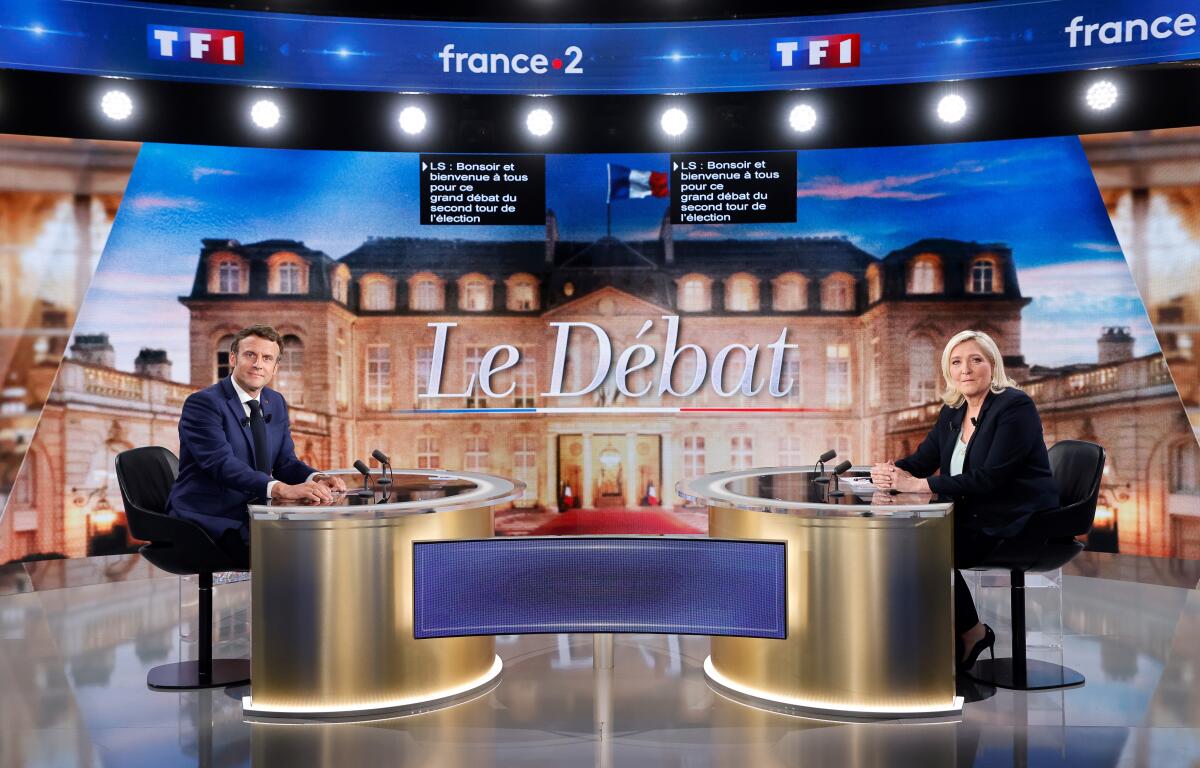
In Wednesday evening’s debate, Le Pen delivered a more polished performance than her crash-and-burn stage presence during the 2017 debate but made clear that her core beliefs had not changed.
“We are facing barbarism,” she said. “We must deal with the problem of massive, unregulated immigration, which is aggravating insecurity in our country.” Le Pen also called Muslim head coverings for women “a uniform imposed by Islamists.”
Seemingly aware of his image as aloof and arrogant, Macron used the debate to try to convince voters that he empathized with them, understood their difficulties — and was the only candidate with realistic solutions. He pledged help for students and higher wages for teachers, and promised to improve working conditions for healthcare workers.
France is allowing healthcare workers who are infected with the coronavirus but have few or no symptoms to keep treating patients rather than isolate.
But his body language — arms crossed as he listened, an expression on his face some saw as patronizing — undercut efforts to identify with everyman voters. So did some of his rhetoric. When Le Pen tried to talk about the national debt, which swelled because of Macron’s pandemic bailout package, he scolded her: “Stop mixing things up.”
With the war in Ukraine, Le Pen’s longtime friendly stance toward Putin has become a point of political vulnerability. In the debate, Macron jabbed at her over a loan to her party for her previous presidential campaign that was contracted through a Russian bank.
“You’re talking about your banker when you talk about Russia,” he said. “You depend on Russian power. You depend on Mr. Putin.”
Over the last decade, Le Pen has tried to rehabilitate her image and that of her movement, an effort critics and backers alike describe as “de-demonization.” In 2011, she rebranded her party as the National Rally, changing its name from the National Front, which under her father, Jean-Marie Le Pen, was long associated with antisemitism and attacks on immigrants.
In France, an upsurge of physical and verbal attacks directed at public officials — often over COVID-19 policies — are ringing alarm bells.
While emphasizing a sympathy for the common man, she has tried to cultivate an almost maternal demeanor that, to some, eclipsed hard-line elements of her platform.
“Her image isn’t excellent, but it’s better than five years ago, and maybe ever,” said Emilien Houard-Vial, who teaches political science at Paris’ Sciences Po university.
At a recent rally, Le Pen took a supporter’s 6-year-old daughter onstage and agreed to the child’s plea that the candidate take her to Disneyland if she is elected president. “This promise, be sure, I will also keep,” Le Pen’s official Twitter account said afterward.
Political theater aside, many voters say they will go to the polls with the aim of defeating one of the candidates, rather than in a genuine expression of support for the other.
A wave of killings of women by their current or former partners has rattled France, where critics blame a deeply entrenched sexism.
Jean Galen, a property developer in southwestern France, plans to vote for Le Pen. He said he now sees Macron, whom he backed in 2017, as domineering and authoritarian-minded.
“I suspect that many will vote for Macron out of fear of Le Pen,” he said. “I am going to vote for Le Pen out of fear of Macron.”
For him, as for a chunk of the electorate, the COVID-19 pandemic is a wedge issue.
In January, Macron used a pungent epithet to describe his desire to isolate and inconvenience those who refuse to be vaccinated. Although some compatriots cheered that remark, Galen was emphatically not among them.
Coralie Renardier, a 27-year-old guest-relations specialist in Paris, doesn’t think Macron lived up to his promises but plans to vote for him anyway.
“It will be too dangerous,” she said, “to have the extreme right.”
El-Faizy is a special correspondent. Times staff writer Laura King in Berlin contributed to this report.
More to Read
Sign up for Essential California
The most important California stories and recommendations in your inbox every morning.
You may occasionally receive promotional content from the Los Angeles Times.
